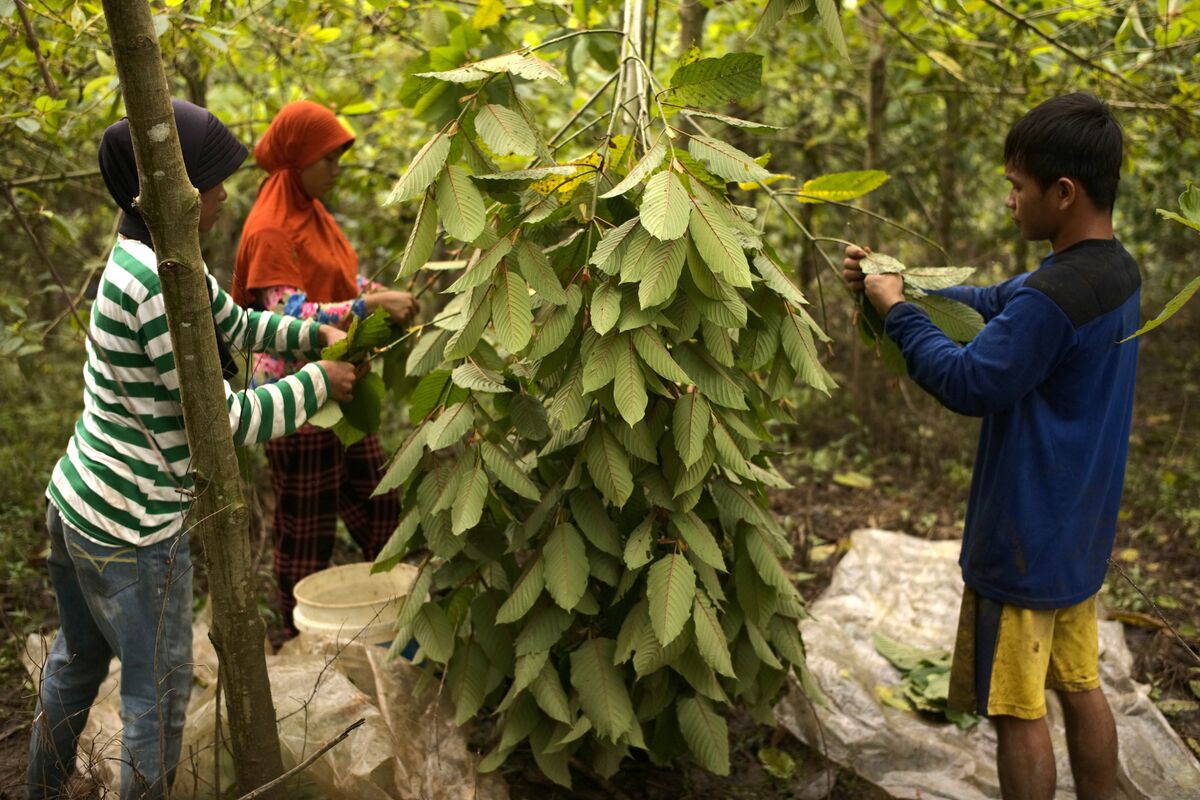Workers harvest kratom leaves at a plantation in Kapuas Hulu, West Kalimantan, Indonesia.
The new system of Fair Trade Kratom that’s being put in place so that farmers can receive payment immediately for their work, without the uncertainties of COD for the farmer and the worries that the US Customs will prevent the American buyer from receiving his or her order, need to be pointed out.
It is not surprising that the current uncontrolled and often-failing system will be missed by those farmers who were working it successfully – and, no doubt, many were honest about the trade of US dollars for Borneo kratom powder, but there were also many disadvantages for both parties.
Packages that were sent, but never arrived, for instance.
The daily effort for farmers to “friend” Facebook users and try to market their wares in this digital door-to-door selling method (which most Americans are very tired of!).
The unthought-of possibility that farmers, by selling their leaves for a fair price to local BUMdes (Village Industry Councils) for a reasonable price, could spend their time more profitably by growing more leaves, buying more farmland, and saving the expense, effort, and risk of buying hightech grinders, learning English, and conducting international business – all in addition to farming.
The Standard Operating Procedures (SOP) being introduced in conjunction with Fair Trade payment practices could be compared to the revolutionary introduction of “assembly-line” production of automobiles by Henry Ford that made modern cars dependable & popular for the consumers.
———————————————————————————————-
Don’t forget the long term risk for U.S. consumers who buy from well-intentioned farmers who use antique kratom grinders which heat up the product and may be leaving heavy metal residue, potentially causing neurological damage later in the life of their customers – all to keep their costs down! Without testing the product, before sending the package to the customer, who’s going to know what the long-term health effects will be?
———————————————————————————————–
We also need to look at the long run benefit of producing a tested, proven-sanitary commodity for a fair trade price, then processing it in a few high tech facilities with high output grinders, digitally tracking the product, handling and packaging it by current Good Manufacturing Practices (cGMP) standards in a few Republic of Indonesia-inspected facilities, and then approving it for export to world destinations that can be confident in the standardized quality they will receive.
Look at the profit for the long term viability of this unique herbal commodity! Imagine removing one of the FDA’s few legitimate complaints about contamination w/ Salmonella, E.coli, heavy metals, mold, and/or adulteration with hard drugs (or cheaper filler leaves)!
Think of how the market for kratom can be expanded beyond smoke shops, online sales to Chronic Pain Patients, and truckers in gas stations – and now marketed to affluent, health-conscious Americans, both old & young, who could benefit if they felt it safe to try this much-maligned herb!
Keep in mind that Indonesia’s competitor Thailand is using a similar Government-mandated approach for producing a tested product they can be proud of.
(Just from a business strategy point of view, does it make sense for big U.S. vendors to cling to higher profit margins by resisting the relatively small expense of paying farmers fairly for producing a clean, pure product and tracking it digitally with chain-of-custody records from field-to-loading dock?)
Vendors here should think also of the shipments lost to Customs seizure due to contamination or Import Alert issues. Imagine the friendly nation of Indonesia applying for an end to the United States’ FDA Import Alerts altogether.
The establishment of some common sense rules for producing this safe herb in sanitary surroundings, with credible third-party testing, and fair pay for labor involved, plus payment of the Republic of Indonesia’s small export tariff would be a small price for the peace-of-mind vendors here would gain with no loss of deposits, loads, or trust in their farmer partners – and acquiring the Republic of Indonesia as a solid partner, helping us lobby to protect access to kratom, both in the USA and worldwide, as a nice side-benefit.
Imagine having Indonesia’s diplomatic support of fair trade kratom on the American Kratom Association’s side, helping to approve national Kratom Consumer Protection Act (KCPA) legislation! Think that might help in keeping kratom legal all across this country?
The days of windfall profits for big vendors, based on HUGE “non-spec” purchases of goods of undetermined quality, are coming to an end. Now, expect high-potency, fair trade kratom to drive cheap low-quality products labeled “kratom” from the market. Which side do you want to bet on?
As Fair Trade Kratom makes headway, expect the FDA’s narrative that kratom is merely an unregulated “herbal drug” for substance-abusers to be abandoned, readying kratom for acceptance on the world stage, alongside coffee.
For more information on the Kratom Fair Trade Association, go to: kratomfta.org
The days of windfall profits for big vendors, based on HUGE “non-spec” purchases of goods of undetermined quality, are coming to an end. Expect high-potency, fair trade kratom to drive cheap low-quality products labeled “kratom” from the market.

